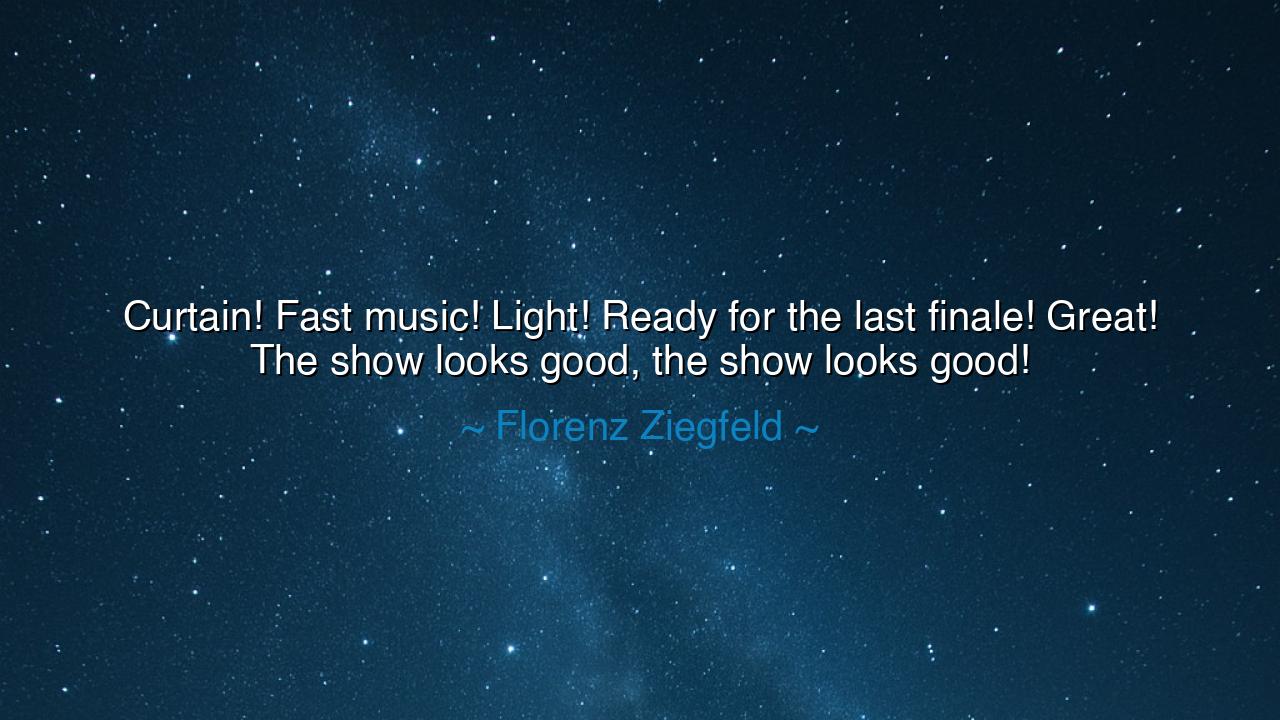
Curtain! Fast music! Light! Ready for the last finale! Great! The
Curtain! Fast music! Light! Ready for the last finale! Great! The show looks good, the show looks good!






When Florenz Ziegfeld cried out, “Curtain! Fast music! Light! Ready for the last finale! Great! The show looks good, the show looks good!” he was not merely calling cues from backstage — he was voicing the spirit of creation itself, the heartbeat of every artist who lives for the magic of the moment. In those final, breathless words lies the soul of the theatre, and indeed, of life itself: the rush of passion, the urgency of beauty, the triumphant will to give one last, radiant performance before the lights go out. For Ziegfeld, the great showman of the early twentieth century, life was a grand production, and to the very end, he stood as its master of ceremonies, directing the dance of light and sound with unbroken fire.
Ziegfeld was a man who understood that the stage is but a mirror of existence — fleeting, dazzling, fragile. Known as the creator of the legendary Ziegfeld Follies, he transformed Broadway into a temple of spectacle. His productions shimmered with life — glittering costumes, soaring music, and the beauty of human form exalted to near-divine expression. But behind the glamour was a spirit of relentless artistry, a man who demanded perfection from chaos, order from emotion. When he shouted his final words, “The show looks good!” from his deathbed, it was as though he were directing his own departure — commanding that even the last act of his life be filled with energy, light, and purpose.
The origin of his quote lies in that moment — his dying breath, when illness had broken his body but not his will. Surrounded by friends and performers, Ziegfeld’s mind drifted to the stage, to the rhythm and glow of his beloved theatre. In those words, he was not speaking of an earthly production, but of the grandest show of all: life itself. “Curtain! Fast music! Light!” — the call to live, to shine, to give one’s all before the end. “Ready for the last finale!” — the acceptance of mortality, not with fear, but with artistic defiance. And “The show looks good!” — the affirmation that he had lived fully, that the story he had written with his days was worthy of applause.
There is something profoundly heroic in those words. Like a general rallying his soldiers for one final charge, or a poet reciting his last line with trembling lips, Ziegfeld faced the inevitable not with despair but with direction. He was, to the end, a creator — shaping the moment, commanding it, giving it form. His words remind us that life itself is a performance: brief, passionate, and illuminated by the will to express. We cannot choose when the curtain falls, but we can choose how brightly the stage will burn before it does.
In every age, the great souls have shared this understanding. Think of Beethoven, deaf and dying, still composing his Ninth Symphony — his triumphant “Ode to Joy” ringing out against silence itself. Think of Leonardo da Vinci, painting until his hands trembled, whispering at the end, “I have offended God and mankind by not doing enough.” And yet, even in their last moments, they were still creating, still striving to make the show look good. Such spirits teach us that creation, courage, and purpose are the lights we must never let go out, even when the darkness gathers.
Ziegfeld’s dying cry, then, is not only for artists, but for all who live with passion. It is a call to finish well — to meet the end of any task, any chapter, any life, with vitality and gratitude. When your time comes to step away from the stage — whether it be the stage of work, of love, or of life itself — let your last act be one of grace, not regret. Say, as he did, “The show looks good,” not because it was flawless, but because it was lived with heart, with honesty, and with the courage to shine.
So, my child, take this lesson to heart: live as though the curtain might rise or fall at any moment. Fill your days with light, your work with purpose, your relationships with music and laughter. When trouble comes, answer with rhythm; when darkness approaches, bring light. And when the final curtain begins to descend, do not fear it — raise your head, breathe deep, and declare with joy, “Ready for the last finale! The show looks good!” For that is the mark of a soul that has truly lived — a soul that has made of its life a masterpiece, radiant even in its closing act.






AAdministratorAdministrator
Welcome, honored guests. Please leave a comment, we will respond soon